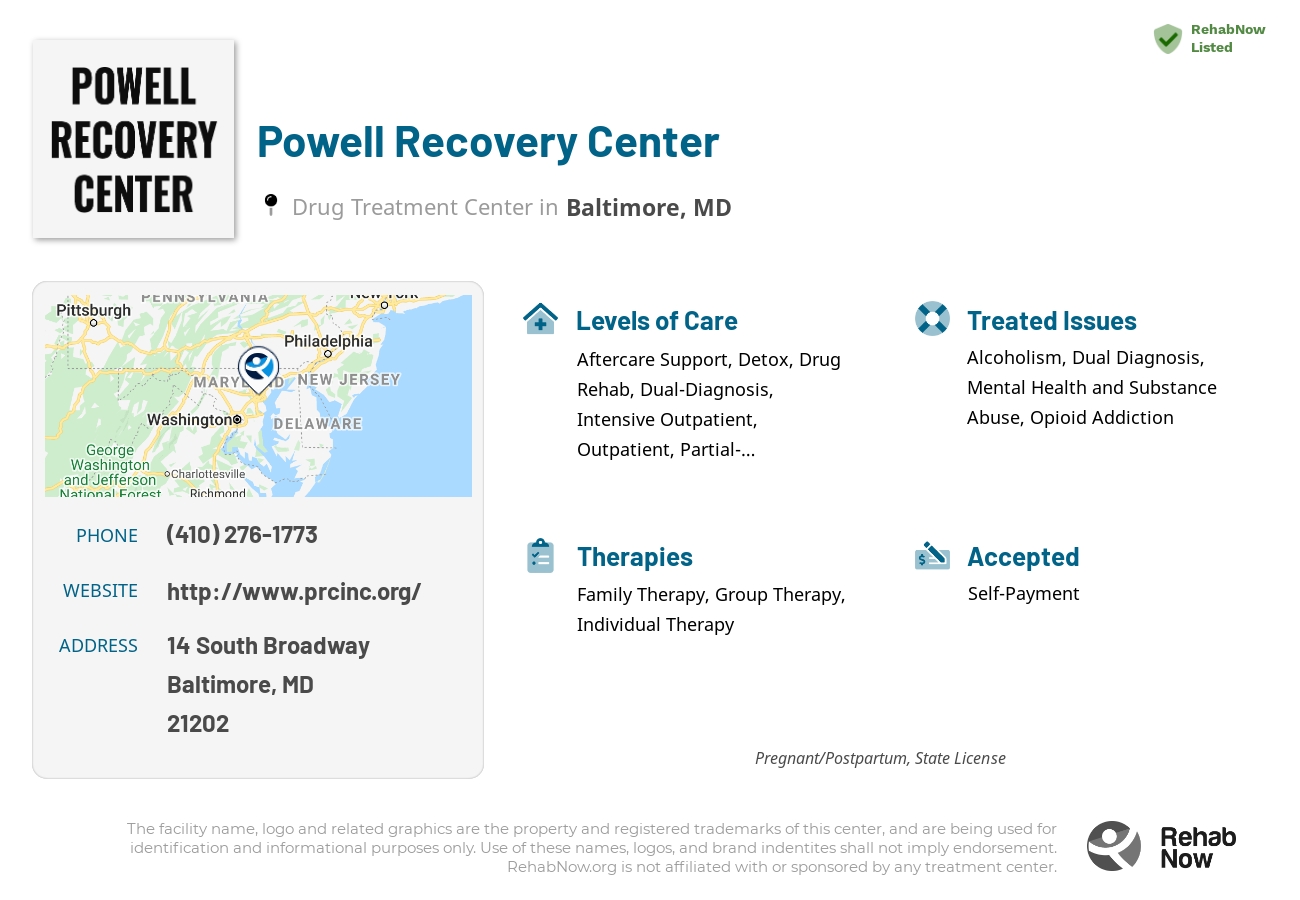Powell Recovery Center
Drug Rehab Center in Baltimore, Maryland
Powell Recovery Center is a comprehensive addiction treatment facility located in Baltimore, MD offering detoxification, residential, Intensive Outpatient, Partial-Hospitalization, Outpatient and Sober-Living / Half-Way Levels of Care programs along with Aftercare Support services to ensure successful sobriety maintenance.
About Powell Recovery Center in Maryland
Powell Recovery Center is an alcoholism, dual diagnosis, opioid addiction, drug addiction, and mental health treatment facility located in Baltimore, Maryland. Accredited by the State License, Powell Recovery Center offers a range of treatment options for individuals suffering from various substance abuse and mental health issues. Their services include aftercare support, detoxification, drug rehabilitation, dual-diagnosis treatment, intensive outpatient programs, outpatient programs, partial-hospitalization, residential treatment, and sober-living/half-way levels of care. With a focus on providing comprehensive and individualized treatment, Powell Recovery Center strives to help individuals regain control of their lives and achieve long-lasting recovery.
Powell Recovery Center in Baltimore, Maryland provides a diverse range of services to address addiction and substance abuse issues. Their treatment options encompass aftercare support, detoxification, drug rehabilitation, dual-diagnosis treatment, intensive outpatient programs, outpatient programs, partial-hospitalization, residential treatment, and sober-living/half-way levels of care. By offering these various levels of care, Powell Recovery Center is able to cater to the unique needs of each individual seeking treatment. Their comprehensive approach focuses not only on addressing addiction but also on addressing any co-occurring mental health disorders. Through their licensed and accredited facility, Powell Recovery Center aims to provide individuals with the support, tools, and guidance necessary for lasting recovery.
Genders
Ages
Modality
Additional
Accreditations
State License
Conditions and Issues Treated
Treatment for opioid addiction is best made with the help of medical professionals who are experienced in dealing with these types of drugs. This treatment can involve medications, exercise, behavioral therapy, and counseling sessions. It is important to note that the effectiveness of treatments for opioid addiction vary, so it is vital to research which treatment options are suitable for each individual.
Many people who struggle with opioid addiction need to attend specific programs like methadone , Suboxone or Vivitrol clinics.
These types of programs will provide the patient with legal, prescription medications that can help them overcome their cravings for illegal opioids like heroin or fentanyl . If the patient has a chronic condition like Hepatitis C, they must undergo treatment before they can begin taking these medications.
Individuals who are addicted to drugs and/or alcohol often have one or more co-occurring mental health disorders. Addressing both the addiction and the mental health problems at facilities like Powell Recovery Center can be very beneficial for these individuals.
Common mental health conditions that often co-occur with addiction include:
- Anxiety Disorders – People with drug and alcohol problems often suffer from anxiety disorders such as panic disorder, obsessive-compulsive disorder, social anxiety disorder, and generalized anxiety disorder.
- Depression – One of the most common mental illnesses co-occurring with addiction is major depressive disorder.
- Attention-deficit hyperactivity disorder (ADHD) – Many people with drug and alcohol problems also suffer from ADHD.
- Bipolar Disorder – People with bipolar disorder are more likely to suffer from drug and alcohol problems than the general population, and vice versa.
Levels of Care Offered
This center offers a variety of custom treatment tailored to individual recovery. Currently available are Aftercare Support, Detox, Drug Rehab, Dual-Diagnosis, Intensive Outpatient, Outpatient, Partial-Hospitalization, Residential, Sober-Living / Half-Way, with additional therapies available as listed below.
Detox is the stage of recovery where the drugs or alcohol are entirely removed from your body. There are two different ways to detox, with medications and without. For many drugs and alcohol, the acute phase of detox can be completed in a number of days.
An intensive outpatient treatment program, or IOP, is set up for those struggling with an addiction to begin the recovery process. However, the patient will not live at the facility during treatment.
IOP involves patients coming in and out of a medical office building regularly to receive therapy and other services while continuing their life outside of these visits.
IOP is a step up from drug detoxification or alcohol detox. However, it’s still considered a phase of recovery rather than the ultimate goal. There are many rehabs and treatment facilities available to patients in need of IOP.
Outpatient treatment can be considered the lowest intensity level of addiction treatment in Baltimore, MD. It is ideal for early phase addiction or lower intensity addictions. Powell Recovery Center peer group support, 12-step programs, and individual counseling are likely to be involved.
A partial hospitalization program (PHP) is designed to help those in Baltimore, MD with acute addiction symptoms. This means the person is treated in a hospital-like setting while still having some freedoms as an outpatient. Most PHPs like Powell Recovery Center require six hours of daily therapy and three days per week of group or individual counseling. If desired, they may sleep onsite or go home (but all participants are monitored more than any other type). These plans usually last one month but can be extended to six months, depending on your weekly time commitment!
Partial hospitalization programs are designed for people who need care but want to stay at home. Outpatient clinically supervised care allows people to participate in treatment while going about their daily lives without staying away from home for long periods.
The Partial Hospitalization Program requires you to be available for individual therapy sessions for a minimum of five days per week for twenty-four weeks. You will be seen for follow-up visits until the treatment is stopped.
Sober living homes are transitional houses for recovering addicts who need more structure than they would receive in an aftercare program. Specific rules and regulations are enforced in these homes, which are beneficial for people who need a greater degree of structure than other types of treatment.
Sober living home options include:
- Live-in managers – might be beneficial to people who do not have a support system in place at home, or who experience high levels of stress between work and home life.
- House managers – House managers are beneficial for people who do not have a strong social network to rely on, or who are concerned about relapse in their daily lives.
- House parents – House parents are beneficial to people who reside in areas without a strong aftercare program for support.
Residential treatment programs are those that offer housing and meals in addition to substance abuse treatment. Rehab facilities that offer residential treatment allow patients to focus solely on recovery, in an environment totally separate from their lives. Some rehab centers specialize in short-term residential treatment (a few days to a week or two), while others solely provide treatment on a long-term basis (several weeks to months). Some offer both, and tailor treatment to the patient’s individual requirements.
Aftercare support is vital to those who have completed a drug or alcohol treatment program. This support comes in individual and family counseling, treatment of psychiatric and other medical conditions, and medications to reduce cravings. It helps recovering addicts adjust to normal day-to-day activities and can last for a year or longer.
The majority of drug and alcohol addicts who receive aftercare treatment do not relapse. It is estimated that without aftercare, the relapse rate will be between 70 to 90 percent for most people. Aftercare is the final stage in addiction recovery, but it will also help maintain sobriety if relapse does occur.
Therapies & Programs
Individual therapy is ideal for addicts who want to focus on themselves. It can also be helpful for those whose withdrawal symptoms are exacerbated by the presence of other people.
Benefits of individual therapy are:
- Access to a personalized treatment plan that focuses on the individual needs of the addict
- More privacy during treatment sessions
- Better personal development through introspection
- Increased self-awareness regarding addictive tendencies in order to avoid relapse
- Greater potential for a long-term recovery plan
- Receiving professional advice and detox assistance from medical staff
Family therapy can help you and your family deal with old issues that may trigger substance abuse. The idea behind family therapy for drug addiction is that you are never fully healed from substance abuse until you’ve healed your relationship with your family, too. To get sober, you need to find a different way to cope with the pain in your life.
This is when a group of people in various stages of recovery meet up and discuss their experiences, triggers, successes, failures, and even alternative therapies! Unlike support groups where everyone already knows each other, group therapy is conducted along side outpatient or inpatient treatment at Powell Recovery Center.
CBT is a psychotherapy approach and method. [ws-nap-name] people to examine how their thoughts, including habitual harmful and inaccurate thinking, affect their actions. CBT is based on the idea that rigid, inflexible thinking leads to poor stress management, which leads to emotional distress.
Similarly, CBT helps people identify and change negative behaviors. It makes you question your perceptions and ask if they are realistic. CBT asks people to examine their behaviors and emotional responses and how they affect their lives. CBT aims to change people’s thinking and behavior to lead a more balanced and healthy life.
Moreover, CBT has been shown to reduce anxiety disorders, depression, and symptoms associated with harmful thoughts or actions.
Payment Options Accepted
For specific insurance or payment methods please contact us.
Is your insurance accepted?
Ask an expert, call (888) 674-0062
Additional Details
Specifics, location, and helpful extra information.
Baltimore, Maryland 21202 Phone Number(410) 276-1773 Meta DetailsUpdated November 25, 2023
Staff Verified
Powell Recovery Center Patient Reviews
There are no reviews yet. Be the first one to write one.
Baltimore, Maryland Addiction Information
For the past decade, Maryland's rate of drug use and abuse has significantly increased. The overdose rate is currently higher than the national average. This epidemic is due to the many industries where manual labor is required. As soon as prescription opioids were more readily accessible a large part of manual workers started using–and eventually abusing–the painkillers.
According to recent statistics, there are around 33,000 people who are addicted to drugs in Baltimore. Heroin-related overdose deaths are quite high in Baltimore, at 837 per 100,000 residents in 2016. Baltimore's most commonly abused drugs include heroin, cocaine, and marijuana. The people of Baltimore are friendly and welcoming, and there's always something going on. If you're looking for a place to start fresh, Baltimore is the perfect place.
Treatment in Nearby Cities
- Sykesville, MD (20.8 mi.)
- Perry Point, MD (33.4 mi.)
- Severna Park, MD (15.5 mi.)
- Easton, MD (45.3 mi.)
- Germantown, MD (37.2 mi.)
Centers near Powell Recovery Center
The facility name, logo and brand are the property and registered trademarks of Powell Recovery Center, and are being used for identification and informational purposes only. Use of these names, logos and brands shall not imply endorsement. RehabNow.org is not affiliated with or sponsored by Powell Recovery Center.










